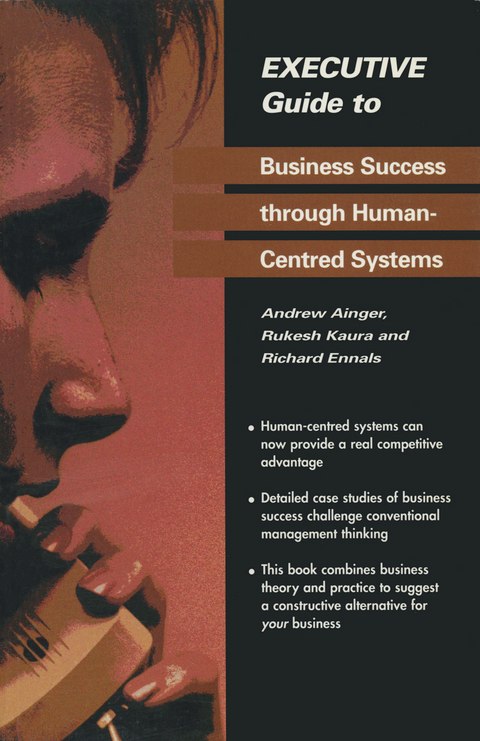
Executive Guide to Business Success through Human-Centred Systems
Springer Berlin (Verlag)
978-3-540-19929-8 (ISBN)
This book is about people and skilled work. There has been much turmoil in the business environment about how to best manage the balance between people and technology, at a time when pressures for cost reduction are ever greater. Our argument is that people are central to business success, and the appropriate use of technology should support their needs. This is not always easy in practice. We work in a period when change occurs in ever-shortening cycles. Black-and-white solutions may seem attractive, but the long-term consequences are rarely advantageous. A new system is required, build ing on lessons from the past. Human-centred systems build upon core skills of the workforce within a rich, emancipatory environment, utilising the benefits of tech nology. Change can be embraced to achieve competitive advantage and mutual benefit. The three authors are, respectively, engineering director of an inno vative international manufacturing company; analyst for an inter national merchant bank; and university business school professor. The book is intended to offer a new synthesis of theory and practical experience, derived from recent British and European collaborative pro grammes. We are grateful to our colleagues and families for their tolerance during the writing of this book. Even human-centred books impose pressures on busy people. Old Windsor, Brighton and Kingston, June 1995 A.A. R.K.
1. Introduction.- Why Read this book?.- What is the Role of Technology in Human-Centred Systems?.- What Will You Learn?.- The Role of Case Studies.- Human-Centred Systems as a Critique.- Knowledge-Based Industry and World Markets.- Competition in Europe.- Innovation vs. Productivity.- Research and Development.- 2. Insights Into Human-Centredness.- Reuniting Hand and Brain.- Taylor and Scientific Management.- McGregor's Theory X and Theory Y.- What are Human-Centred Systems?,..- Human-Centred IT.- Designing Tools for Skilled Workers.- Technocentric and Human-Centred Approaches.- Introducing New Technology and Methods.- Towards Human-Centred Design.- The Next Cycle.- 3. The New Rules.- Knowledge and the Worker.- What is Knowledge?.- The Darwinian Workplace.- Loyalty, the Outdated Concept?.- A New Form of Work Organisation.- The Ethics of Business.- Lessons for Business from the Voluntary Sector.- What Can Be Learnt?.- 4. Business Process Re-Engineering.- Lessons from East Germany.- Two Degrees of Culture.- Types of Re-engineering.- Back to the Drawing Board.- IT the Enabler.- Learning from the Factory.- Regenerating the Organisation.- 5. Empowerment.- Flat Pyramids: the Future?.- Responsibilisation: Is it for You?.- Levels of Empowerment.- IT and the Shop Floor.- A New Structure.- Potential Problems: Opening Pandora's Box.- The Hawthorne Effect.- Abraham Maslow and B. F. Skinner.- 6. Teamworking.- Teams: Flavour of the Month.- Groupware.- Challenging Orthodoxy.- A Question of Language.- Group Working on the Factory Floor.- Implementing Cells.- Forming Cells into Business Units.- IT in Cells.- 7. Skill And Competence.- Skill: Comparison.- Vocational vs. Academic.- National Vocational Qualifications (NVQs).- The German System.- The Apprentice: Twentieth-century Dodo.-Manufacturing in Britain.- What is Management Training?.- Management Training and a Competence Approach.- 8. Quality.- The Search for Total Quality.- What is TQM?.- Benchmarking.- The Quality Standards.- The Quality Awards.- TQM in the Public Sector: An Oxymoron?.- The Quality of Life.- Deming Revisited.- Deming vs. Taylor: The Differences.- 9. Developments And The Way Forward.- Context.- Human-Centred Strategy.- Appendix 1: Volvo, Uddevalla and Kalmar, Sweden.- Appendix 2: ESPRIT 1217 (1199): Human-Centred CIM.- Appendix 3: The MOPS Programme.- Appendix 4: BESTMAN.- Appendix.5: ITW DeVilbiss Ransburg.- References and Further Reading.- Name Index.
| Erscheint lt. Verlag | 15.9.1995 |
|---|---|
| Reihe/Serie | Executive Guides |
| Zusatzinfo | IX, 181 p. |
| Verlagsort | London |
| Sprache | englisch |
| Maße | 155 x 235 mm |
| Gewicht | 310 g |
| Themenwelt | Mathematik / Informatik ► Informatik ► Netzwerke |
| Informatik ► Theorie / Studium ► Künstliche Intelligenz / Robotik | |
| Schlagworte | Benchmarking • Design • ethics • Executive Guides • Groupware • Informationssystem • Innovation • Knowledge • learning • Management • Management training |
| ISBN-10 | 3-540-19929-2 / 3540199292 |
| ISBN-13 | 978-3-540-19929-8 / 9783540199298 |
| Zustand | Neuware |
| Haben Sie eine Frage zum Produkt? |
aus dem Bereich


